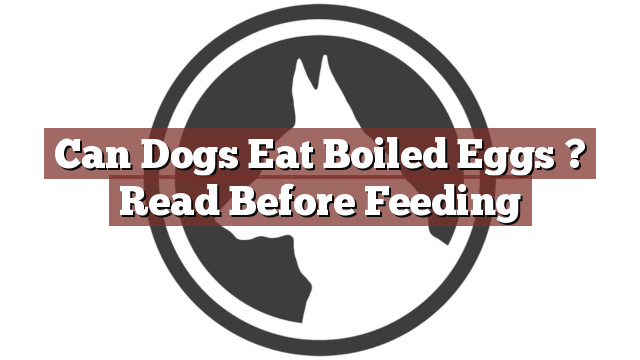Understanding Your Dog’s Dietary Needs
As a responsible pet owner, it is essential to understand your dog’s dietary needs. Providing a balanced and nutritious diet is crucial for your furry friend’s overall health and well-being. While dogs primarily thrive on a diet that includes high-quality dog food, there are certain human foods that can be incorporated into their diet in moderation. However, it is important to note that not all human foods are safe for dogs to consume. Before introducing any new food into your dog’s diet, it is always recommended to do thorough research and consult with your veterinarian.
Can Dogs Eat Boiled Eggs? Read Before Feeding
Can dogs eat boiled eggs? This is a commonly asked question among pet owners. The answer is yes, dogs can eat boiled eggs in moderation. Eggs are a good source of protein and provide essential nutrients such as vitamins A, B12, and E, as well as iron and riboflavin. However, it is important to feed boiled eggs to your dog without any added ingredients or seasonings. Salt, spices, or other flavorings can be harmful to dogs and may upset their stomach. It is best to give plain boiled eggs to your dog.
Pros and Cons of Feeding Boiled Eggs to Dogs
Feeding boiled eggs to your dog has several benefits. As mentioned earlier, eggs are an excellent source of protein, which is essential for your dog’s muscle development and overall growth. Protein also helps in repairing tissues and promoting a healthy immune system. Eggs also contain healthy fats that contribute to a shiny coat and healthy skin. Moreover, eggs are a good source of vitamins and minerals, which are vital for your dog’s overall health.
While there are many advantages to feeding boiled eggs to your dog, it is essential to consider the potential drawbacks as well. Some dogs may be allergic to eggs, so it is important to monitor your dog for any signs of an allergic reaction after consuming boiled eggs. Additionally, eggs should only be given as an occasional treat and not as a regular part of your dog’s diet. Overfeeding eggs can lead to an excess intake of fats, which may cause gastrointestinal issues such as diarrhea or pancreatitis.
Conclusion: Should You Feed Your Dog Boiled Eggs?
In conclusion, yes, dogs can eat boiled eggs as long as they are plain and free from any seasonings. Eggs provide a good source of protein, vitamins, and minerals, which can be beneficial for your dog’s health. However, it is important to feed eggs in moderation and monitor your dog for any signs of allergies or digestive issues. Remember to always consult with your veterinarian before introducing any new food into your dog’s diet to ensure it is suitable for their specific needs. Your veterinarian can provide guidance and recommendations based on your dog’s age, breed, and overall health condition.
Thank you for taking the time to read through our exploration of [page_title]. As every dog lover knows, our furry friends have unique dietary needs and responses, often varying from one canine to another. This is why it's paramount to approach any changes in their diet with caution and knowledge.
Before introducing any new treats or making alterations to your dog's diet based on our insights, it's crucial to consult with a veterinarian about [page_title]. Their expertise ensures that the choices you make are well-suited to your particular pet's health and well-being.
Even seemingly harmless foods can sometimes lead to allergic reactions or digestive issues, which is why monitoring your dog after introducing any new food item is essential.
The content provided here on [page_title] is crafted with care, thorough research, and a genuine love for dogs. Nevertheless, it serves as a general guideline and should not be considered a substitute for professional veterinary advice.
Always prioritize the expert insights of your veterinarian, and remember that the health and happiness of your furry companion come first.
May your journey with your pet continue to be filled with joy, love, and safe culinary adventures. Happy reading, and even happier snacking for your canine friend!

